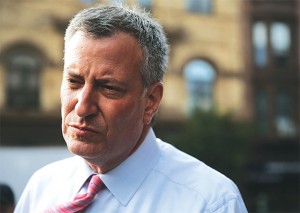Mayor Bill de Blasio, faced with a criminal investigation into his campaign fundraising, dismissed the suggestion of wrongdoing Friday morning. His administration had followed the “intent and letter of the law,” de Blasio claimed in an interview on WNYC’s Brian Lehrer Show.
“No one should fall into a narrow place of saying someone took a donation therefore something bad has happened,” he later added.
State and federal authorities are probing the mayor’s fundraising activities going back to 2014 and 2013. Part of the investigation reportedly concerns the allegation that in a bid to evade contribution limits, de Blasio may have illegally funneled contributions to candidates in the 2014 state Senate election.
Real estate executives account for a large share of de Blasio’s fundraising, and the New York Times on Friday named developer John Catsimatidis as one of the donors in question.
“I saw him at the Al Smith dinner and he said, ‘Can you do me a favor and send it to them?’” Catsimatidis told the Times, referring to a conversation with de Blasio. “I never got anything in return. Later on I found out they sent it to the state Democrats, the Senate.”
De Blasio has also been under fire for his ties to Jona Rechnitz, a Brooklyn developer and major bundler for the mayor who is under investigation as part of a police corruption probe.
On Thursday, The Real Deal reported that de Blasio’s biggest campaign contribution bundler for his 2017 re-election bid is a senior executive at co-working space company WeWork. The company is one of the largest private tenants in New York and is building on city-owned land in the Brooklyn Navy Yard.
Confronted with the point that his predecessor Michael Bloomberg didn’t have to deal with similar allegations because his campaign was self-funded, de Blasio told Lehrer: “I think the flip side of that equation is a yearning for the wealthy to be in charge. I’ve always had a problem with that. It only digs in a set of problems when people with economic power also hold political power.”
Four years ago, as New York City’s public advocate, Bill de Blasio launched a campaign to limit corporate donations to politicians. “It is important that I help give citizens the opportunity to voice their contempt for corporate spending in our elections and affect change,” he wrote in a press release announcing the campaign in January 2012.
De Blasio lauded Sen. Bernie Sanders’ success in funding his presidential campaign largely through small individual donations, but argued that doing so is far easier on the national than the local level. Still, he said he would also seek small-time contributions for his 2017 re-election bid.
“I’m certainly going to do a lot of reaching out to New Yorkers,” de Blasio said. “I’m going to ask them to give $27 or whatever it is.”
